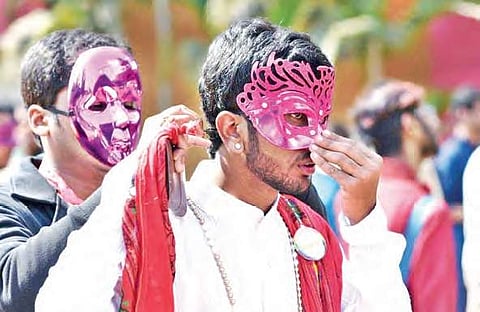Just let them be gay
HYDERABAD: In a major relief to the LGBTQ community in the city, a special five-judge constitutional bench of the Supreme Court will hear petitions challenging the controversial Section 377 of the IPC on Tuesday. The Section criminalises homosexuality by terming it as unnatural sex. Activists and psychiatrists consider this a positive sign.
It’s more than three months since the Indian Psychiatric Society (IPS) declared that homosexuality is not a mental illness, much less a crime. However, awareness continues to be drastically low in the society and, as a result, stigma runs high. Many parents continue to consider homosexuality as ‘unnatural’ leading to conflicts when the sexual orientation of their children is discovered.
Psychiatrists are currently restricted by laws that hold the practice criminal. As a result, there is no scope to conduct awareness programmes. Like in the case of an engineering student, whose parents approached a shrink asking for their child to be counselled so that his sexual orientation would change. “I had to sit them down and explain to them that homosexuality was as natural as heterosexuality.
In fact, by not accepting a child’s sexual orientation, many parents and the society at large push them into depression,” says city-based psychiatrist Dr. Naresh Vadlamani. “The strong social stigma forces gay people to bury what’s troubling them.” “To keep these suppressed emotions at bay, they take up harmful behaviours like substance abuse and also suffer from anxiety disorders. The social stigma surrounding homosexuality prevents them from facing their own truth, leading to mental illnesses,” said another psychiatrist Dr. George Reddy.
“One such person approached me claiming he was experiencing suicidal tendencies because he couldn’t share his sexual orientation with his parents.
He feared it would cause trouble for his siblings,” added George. This is mainly due to lack of awareness programmes to educate parents and homosexuals alike, state these doctors. Dr. Vadlamani said, “The constitution calls it a crime, under Sec 377 of the IPC. We cannot conduct any kind of awareness programmes as it is a legal issue. However, we need to look at the psychological impact it has on these people and how it can be dangerous for their survival, considering homosexuality is normal among humans and all discovered species of animals.”
Small, but progressive steps
Members from the community say the situation is a lot better than it used to be. The Queer Pride March has helped, along with certain private groups and NGOs taking up awareness programmes. “This is, however, need-based and not a continuous approach. We have cases of work place acceptance, where companies have absorbed homosexuals into their work force,” said Ravi Kiran, who works with the community members.
Not a mental illness, then why still a crime?
The Indian Psychiatric Society (IPS) took a stand on the issue, a few months ago stating that Sec 377 of the IPC is archaic and it needs to abolished. President of the IPS, Dr Ajit Bhide, said that it would help if the Court also consulted the IPS while hearing the petitions. The IPS had constituted a task force in 2017 on the issues of the LGBT community. The committee met in Mumbai in March and took the stand stating that it is not a mental illness nor a crime.
This is in line with the American Psychiatric Association and the International Classification of Diseases of the World Health Organization, which removed homosexuality from the lost of psychiatric disorders. The IPS recognises same sex sexuality as a normal variant of human sexuality, much like heterosexuality and bisexuality. There is no evidence that sexual orientation can be altered by any treatment and any such attempts may in fact lead to low self esteem of the person.

